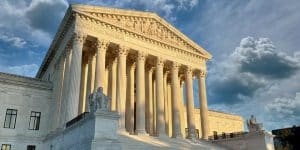Updated May 30, 2024
Recent Landmark Employment Law Cases in the U.S.
The employment landscape in the United States has witnessed a series of pivotal legal rulings over the past five years, significantly shaping the rights and obligations of both employers and employees. From clarifying the boundaries of religious accommodations to redefining the scope of whistleblower protections, the U.S. Supreme Court (USSC) and lower federal courts have tackled a wide range of employment-related issues, often with far-reaching consequences.
This comprehensive article delves into the most significant employment law cases that have emerged between 2019 and 2024, analyzing their impact on the evolving landscape of workplace rights and responsibilities. By synthesizing insights from these landmark decisions, we aim to equip employers, employees, and legal professionals with a thorough understanding of the shifting legal landscape, empowering them to navigate the complexities of modern-day employment dynamics.
1. Discrimination During Hiring
Department of Justice and Apple Reach $25 Million Landmark Settlement
Nov 14, 2023 — In a landmark settlement, Apple Inc. agreed to pay $25 million to settle claims by the U.S. Department of Justice that the tech giant illegally favored the hiring of immigrant workers over U.S. citizens and green card holders. The DOJ initiated an investigation in February 2019 into Apple’s recruitment practices for positions hired through the Permanent Labor Certification (PERM) program. The PERM program allows U.S. employers to hire foreign workers and sponsor them for employment-based green cards, as long as the hiring of a non-U.S. citizen employee would not prevent equally capable U.S. workers from procuring a similar position.
2. Categorizing Ride-Service Drivers
Aslam v. Uber (2021): Redefining Employment Status in the Gig Economy
The rise of the gig economy has brought about new challenges in the realm of employment law. In the case of Aslam v. Uber, the Supreme Court was tasked with determining the employment status of Uber drivers. Uber had classified its drivers as independent contractors, rather than employees, in an effort to avoid providing them with minimum wage, paid leave, and other worker protections.
However, the Supreme Court rejected Uber’s contractual arrangements and ruled that the drivers were, in fact, workers. The Court emphasized that tribunals must examine the actual relationship between the parties, rather than relying solely on the terms of the contract. This landmark decision has far-reaching implications, as it suggests that companies in the gig economy cannot simply label their workers as independent contractors to avoid their legal obligations.
3. Redefining the “Undue Hardship” Standard for Religious Accommodations
Groff v. DeJoy
One of the most closely watched employment law cases in recent years was Groff v. DeJoy, decided by the USSC in June 2023. The case centered around the issue of religious accommodations in the workplace, with the Court seeking to clarify the “undue hardship” standard under Title VII of the Civil Rights Act.
The case involved a postal worker, Gerald Groff, who requested time off on Sundays to observe his religious beliefs. The United States Postal Service (USPS) had historically granted such accommodations, but the explosive growth of competitive delivery services operating seven days a week made it increasingly challenging to do so.
In its ruling, the USSC established that for an employer to satisfy the “undue hardship” standard, they must demonstrate that an accommodation would result in “substantially increased costs in relation to the conduct of the particular business.” This decision marks a significant departure from the previous “de minimis cost” threshold, effectively raising the bar for employers seeking to deny religious accommodations.
The Groff v. DeJoy ruling also draws a closer parallel between the standards for denying religious accommodations and those for denying accommodations under the Americans with Disabilities Act (ADA), which require “significant difficulty or expense” as the only acceptable reason for refusal.
4. Whistleblower Protection
Navigating the Sarbanes-Oxley Act
Another high-profile case that reached the USSC in 2023 was Murray v. UBS Securities, LLC, which centered on the issue of whistleblower protection under the Sarbanes-Oxley Act (SOX).
The Sarbanes-Oxley Act, enacted in the wake of the Enron scandal, includes a whistleblower protection provision that shields employees who report suspected SOX violations from adverse employment actions. The key question in Murray v. UBS Securities, LLC was whether a whistleblower must prove that the employer acted with “retaliatory intent” to invoke this protection.
The petitioner, Trevor Murray, had reported alleged fraud to his supervisors and was subsequently fired. After winning at the trial court level, the decision was vacated by the U.S. Court of Appeals for the Second Circuit, which held that Murray had to prove his employer’s retaliatory intent to succeed with his whistleblower claim.
The USSC’s pending decision in this case could have significant implications for the future of whistleblower protection. If the Court sides with the Second Circuit’s standard, it would increase the burden of proof for whistleblowers and potentially discourage employees from coming forward to report illegal activities. Conversely, a ruling in favor of Murray’s position would shift the burden to the employer, requiring them to demonstrate that the adverse action was not motivated by the employee’s whistleblowing.
5. Redefining the Scope of Discrimination
Muldrow v. City of St. Louis
The USSC also heard arguments in Muldrow v. City of St. Louis, a case that could redefine the scope of employment discrimination under Title VII of the Civil Rights Act.
The case involved Jatonya Muldrow, a female employee of the St. Louis Police Department who was hired as an intelligence officer and subsequently transferred to a less prestigious position with fewer responsibilities, but without any change in compensation. Muldrow’s supervisor allegedly wanted a man in the intelligence officer position and sidelined her to make way for a male replacement.
For decades, lower courts have generally assumed that discrimination requires “significant” and “materially adverse” actions by the employer, such as termination, demotion, or suspension. The USSC’s decision in Muldrow v. City of St. Louis will determine whether an involuntary job transfer, without a change in pay, can still be considered a violation of Title VII.
The Court’s ruling, expected by the end of June 2024, has the potential to broaden the legal understanding of what constitutes actionable discrimination, potentially extending Title VII’s protections to a wider range of employer actions that may not involve direct financial consequences for the employee.
6. Challenging the Chevron Doctrine
Relentless v. Department of Commerce and Loper Bright Enterprises v. Raimondo
Two cases argued before the USSC on January 17, 2024 – Relentless v. Department of Commerce and Loper Bright Enterprises v. Raimondo – could significantly alter the balance of power between federal agencies and the federal judiciary in the interpretation and application of employment-related laws and regulations.
These cases challenge the federal government’s requirement for fishing companies to pay for federal monitors on their boats, a mandate based on an administrative agency’s interpretation of federal statute. The cases raise questions about the longstanding Chevron doctrine, which instructs federal courts to defer to an administrative agency’s reasonable interpretation of ambiguous statutory language.
During the oral arguments, the Court’s conservative justices expressed concerns that the Chevron doctrine allows Congress to “punt” difficult policy decisions to unelected bureaucrats and enables agencies to shift their interpretations from one administration to another. In contrast, the liberal justices emphasized the limits of judicial expertise and the need to rely on the specialized knowledge and accountability of federal agencies.
The USSC’s decision, expected before the end of June 2024, could have far-reaching implications for the framework of laws regulating the workplace and the interpretation and enforcement of those laws. A ruling that overturns or significantly limits the Chevron doctrine would shift the balance of power, potentially allowing federal courts to take a more active role in interpreting and applying employment-related statutes.
7. Navigating the Gig Economy
Moliga v. Qdoba Restaurant Corporation
The employment landscape has been significantly shaped by the rise of the “gig economy,” with a growing number of workers operating as independent contractors rather than traditional employees. One case that addresses this emerging dynamic is Moliga v. Qdoba Restaurant Corporation, which was filed in the U.S. District Court for the Western District of Washington in July 2023.
The case involves a Qdoba restaurant worker, Moliga, who alleges that the company misclassified him as an independent contractor, depriving him of protections and benefits afforded to employees under the Americans with Disabilities Act (ADA). Moliga claims that Qdoba exerted significant control over his work, including setting his schedule, dictating his uniform, and closely monitoring his performance, despite classifying him as an independent contractor.
The outcome of this case could have far-reaching implications for the gig economy, as it challenges the longstanding legal framework for distinguishing between employees and independent contractors. If Moliga prevails, it could pave the way for greater scrutiny of gig economy business models and potentially lead to the reclassification of many workers as employees, entitling them to a range of legal protections and benefits.
8. Redefining the Scope of FLSA Overtime Exemptions
Neal Bissonnette, et al. v. LePage Bakeries Park St., LLC
Another case that could significantly impact employment law is Neal Bissonnette, et al. v. LePage Bakeries Park St., LLC, which was filed in the USSC in July 2023. This case centers on the interpretation of the Fair Labor Standards Act (FLSA) and its overtime exemptions.
The case involves a group of bakery workers who were classified as exempt from FLSA overtime requirements due to their job duties, despite working more than 40 hours per week. The workers argue that their job duties did not truly align with the FLSA’s executive, administrative, or professional exemptions, and that they should have been entitled to overtime pay.
The USSC’s ruling in this case could provide much-needed clarity on the scope and application of FLSA overtime exemptions, particularly in the context of evolving job roles and responsibilities in the modern workplace. A decision that favors the bakery workers could potentially lead to a re-evaluation of overtime exemptions across a wide range of industries, with significant implications for employers and employees alike.
9. Navigating Meal and Rest Break Requirements
Restaurant Law Center v. LABR and Mayfield v. LABR
The issue of meal and rest break requirements for employees has also been the subject of recent legal battles, as evidenced by the cases Restaurant Law Center v. LABR and Mayfield v. LABR, both of which are currently pending in the U.S. Court of Appeals for the Fifth Circuit.
In Restaurant Law Center v. LABR, the restaurant industry is challenging the Department of Labor’s (DOL) interpretation of the FLSA’s meal and rest break requirements. The industry argues that employers should not be obligated to police employee breaks or ensure that no work is performed during those periods.
Mayfield v. LABR, on the other hand, involves a worker who claims that her employer’s failure to maintain records of her meal and rest breaks creates a presumption that the breaks were not provided, as required by California law.
These cases highlight the ongoing tension between employers’ desire for flexibility in managing their workforce and employees’ need for adequate rest and recovery time. The Fifth Circuit’s rulings could provide much-needed clarity on the extent of an employer’s obligations regarding meal and rest breaks, potentially setting precedents that will influence workplace policies and practices across the country.
10. Addressing Obesity as a Disability
Valtierra v. Medtronic Inc. and Richardson v. Chicago Transit Authority
The question of whether obesity should be considered a disability under the Americans with Disabilities Act (ADA) has been the subject of ongoing legal debate, with two recent cases – Valtierra v. Medtronic Inc. and Richardson v. Chicago Transit Authority – contributing to the evolving jurisprudence.
In Valtierra v. Medtronic Inc., the Ninth Circuit Court of Appeals declined to join several other appeals courts in holding that obesity can only constitute a disability under the ADA if it is caused by an underlying physiological condition. Instead, the court opted not to definitively answer the question, leaving the door open for future cases to further explore the issue.
Similarly, in Richardson v. Chicago Transit Authority, the Seventh Circuit Court of Appeals held that obesity is not a protected disability under the ADA unless the plaintiff can demonstrate that it is caused by an underlying physiological disorder or condition.
These rulings highlight the ongoing uncertainty surrounding the legal status of obesity as a disability, with courts grappling to establish clear and consistent standards. As the prevalence of obesity continues to rise, the resolution of this issue could have significant implications for the rights and protections afforded to employees struggling with weight-related health concerns.
11. Arbitration and ERISA
Bergamatto v. Board of Trustees of the Nysa-Ila Pension Fund and New Prime Inc. v. Oliveira
The interplay between arbitration and employee benefit plans has also been a focus of recent employment law cases, with two notable decisions – Bergamatto v. Board of Trustees of the Nysa-Ila Pension Fund and New Prime Inc. v. Oliveira – addressing these complex issues.
In Bergamatto v. Board of Trustees of the Nysa-Ila Pension Fund, the Third Circuit Court of Appeals joined several other circuits in declining to impose liability on alleged “de facto” plan administrators under the Employee Retirement Income Security Act (ERISA). The court held that the plan administrator, as defined by the terms of the plan, was the only party that could be held liable for failing to provide requested information to plan participants.
Meanwhile, in New Prime Inc. v. Oliveira, the U.S. Supreme Court ruled that the Federal Arbitration Act’s exemption for “contracts of employment” applies to all workers engaged in interstate commerce, regardless of whether they are classified as employees or independent contractors. This decision effectively prevents companies from compelling arbitration of certain employment-related disputes, even when the worker has signed an agreement to arbitrate.
These cases highlight the ongoing tension between the enforceability of arbitration agreements and the protections afforded to employees under ERISA and other employment-related statutes. As the legal landscape continues to evolve, employers and employees must navigate these complex issues with care to ensure compliance and protect their respective rights.
12. Addressing Workplace Discrimination
Shell v. Burlington Northern Santa Fe Railway Co. and Fox v. Costco Wholesale Corporation
The issue of workplace discrimination has also been the subject of several notable employment law cases in recent years, including Shell v. Burlington Northern Santa Fe Railway Co. and Fox v. Costco Wholesale Corporation.
In Shell v. Burlington Northern Santa Fe Railway Co., the Seventh Circuit Court of Appeals ruled that an employer’s refusal to hire an obese applicant due to concerns about future obesity-related medical conditions did not violate the ADA. The court determined that discrimination based on future impairments was not covered by the ADA, providing employers with a potential defense against claims of disability discrimination.
Conversely, in Fox v. Costco Wholesale Corporation, the Second Circuit Court of Appeals explicitly recognized that hostile work environment claims are cognizable under the ADA, clarifying an area of legal uncertainty. This decision expanded the scope of workplace discrimination protections for employees with disabilities, potentially paving the way for more robust enforcement of the ADA’s anti-harassment provisions.
These cases demonstrate the ongoing evolution of employment discrimination law, with courts grappling to balance the rights of employers and employees in the face of complex and often nuanced workplace dynamics.
13. Navigating the Intersection of Public Employment and Free Speech
Tauscher v. Phoenix Board of Realtors and Richardson v. Chicago Transit Authority
The intersection of public employment and free speech rights has also been a focus of recent employment law cases, with Tauscher v. Phoenix Board of Realtors and Richardson v. Chicago Transit Authority addressing these issues.
In Tauscher v. Phoenix Board of Realtors, the Ninth Circuit Court of Appeals provided guidance on an employer’s obligations to accommodate disabled customers and patrons in public-facing businesses. The decision emphasized the need for owners of public accommodations to ensure that their facilities and policies do not discriminate against individuals with disabilities.
Meanwhile, in Richardson v. Chicago Transit Authority, the Seventh Circuit Court of Appeals held that obesity is not a protected disability under the ADA unless the plaintiff can demonstrate that it is caused by an underlying physiological condition. This ruling brought the Seventh Circuit in line with several other appeals courts, providing clarity on the legal status of obesity as a disability.
These cases highlight the complex and evolving nature of employment law, as courts navigate the delicate balance between the rights of employers, employees, and the public at large. As the legal landscape continues to shift, it is crucial for all stakeholders to stay informed and adapt their practices accordingly.
Conclusion
The employment law landscape in the United States has undergone a significant transformation over the past five years, with the U.S. Supreme Court and lower federal courts issuing a series of landmark decisions that have redefined the rights and obligations of employers and employees.
From clarifying the standards for religious accommodations and whistleblower protection to redefining the scope of employment discrimination and the role of federal agencies, these rulings have had far-reaching implications across a wide range of industries and workplace settings.
As the legal landscape continues to evolve, it is essential for employers, employees, and legal professionals to stay informed and adapt their practices to ensure compliance and protect the rights of all stakeholders. By closely monitoring these developments and proactively addressing emerging challenges, we can foster a more equitable and harmonious employment ecosystem, one that empowers workers, supports businesses, and upholds the principles of justice and fairness.
At the federal level, several key laws form the foundation of U.S. employment law. These laws include:
- The Civil Rights Act of 1964 (Civil Rights Act): This landmark legislation prohibits workplace discrimination based on race, color, religion, sex, or national origin.
- The Americans with Disabilities Act (ADA): The ADA protects individuals with disabilities from discrimination in employment and requires employers to provide reasonable accommodations.
- The Age Discrimination in Employment Act (ADEA): The ADEA prohibits age discrimination against individuals who are 40 years of age or older.
- The Fair Labor Standards Act (FLSA): The FLSA establishes minimum wage, overtime pay, and child labor standards.
- The Family and Medical Leave Act (FMLA): The FMLA provides eligible employees with job-protected leave for certain family and medical reasons.
- The Occupational Safety and Health Act (OSHA): OSHA sets safety and health standards in the workplace to ensure employees have a safe working environment.
These federal laws lay the groundwork for employment regulations, but it’s important to note that individual states may have additional laws that provide further protections for employees.
If you’re in need of legal assistance related to employment matters, consult an experienced employment lawyer who can provide the support and expertise necessary to protect your rights and achieve a favorable outcome.
FAQs: Workplace Lawsuits and The Role of Employment Attorneys
The cost of hiring an employment lawyer can vary depending on various factors, such as the complexity of your case, the lawyer’s experience, and the region where you reside. Some employment lawyers charge an hourly rate, while others may work on a contingency fee basis or offer flat fees for specific services. It’s important to discuss fees and payment arrangements with your lawyer during the initial consultation. Most will employ a “No win, no fee” policy.
While it’s possible to handle some employment disputes without hiring a lawyer, it’s generally advisable to seek legal counsel, especially for complex or high-stakes cases. Employment lawyers have the expertise and knowledge to navigate the legal process, advocate for your rights, and maximize your chances of achieving a favorable outcome.
Every case is unique, so it’s impossible to say how much your case is worth without a thorough case review and free attorney consultation. When you call Setyan Law, we will explain the value of your case and help you understand how much it may be worth.
The duration of an employment law case can vary significantly depending on various factors, such as the complexity of the case, the court’s caseload, and the availability of evidence. Some cases can be resolved through negotiation or settlement within a few months, while others may require litigation and can take a year or longer to reach a resolution. It’s important to discuss the timeline of your specific case with your employment lawyer.
Yes, employment lawyers can provide valuable assistance with contract negotiations. Whether you’re an employee negotiating the terms of your employment contract or an employer drafting agreements for your workforce, an employment lawyer can review the contract, advise you on your rights and obligations, and help you negotiate favorable terms. They can also ensure that the contract complies with applicable employment laws and protects your interests.
Consulting a Los Angeles labor attorney will provide you with the necessary guidance and support to navigate the legal process effectively. If you’ve been denied your rights as an employee by your employer, time is of the essence, please seek legal advice promptly to maximize your chances of a successful outcome.
Call Setyan Law at (213)-618-3655 for a consultation.






